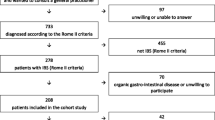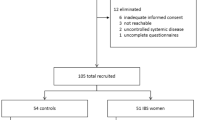Abstract
Objective
The impact of irritable bowel syndrome (IBS) on HRQOL has been widely studied in the West. However, there are few data from Asian countries. The aim of this study was to assess the health-related quality of life (HRQOL) of patients suffering from IBS in Korea.
Methods
Consecutive patients from six secondary and six tertiary medical centers in Korea were enrolled and completed self-administered questionnaires on sociodemographics and IBS-associated symptoms. HRQOL was assessed using the generic Short Form 36 (SF-36) and the disease-specific IBS-QOL questionnaires.
Results
Of the 932 patients with abdominal pain and bowel symptoms, 664 IBS patients who fulfilled the Rome II criteria were analyzed. On all eight SF-36 scales, IBS patients had a significantly worse HRQOL than the general population (P < 0.01). The overall score for the IBS-QOL was 74.2. The health concern domain was most affected (mean score 64.2), and the sexual domain (mean score 86.7) was least affected in the IBS-QOL. Significant impairment of HRQOL was only observed in patients with severe symptoms both in the generic and specific HRQOL measurement, whereas patients with mild and moderate symptoms showed only mild impairment (P < 0.01). Female patients reported a significantly lower HRQOL than male patients (P < 0.05), but the difference was minimal. The IBS-QOL was significantly associated with female gender, total symptom score, self-reported symptom severity, and level of education in the multivariate analysis.
Conclusions
IBS-related symptoms had a great effect on the HRQOL of Korean patients. These results and the considerable prevalence of IBS in Korea indicate that IBS has a substantial social impact in this country.

Similar content being viewed by others
Abbreviations
- IBS:
-
Irritable bowel syndrome
- IBS-C:
-
Constipation-predominant irritable bowel syndrome
- IBS-D:
-
Diarrhea-predominant irritable bowel syndrome
- IBS-M:
-
Mixed type irritable bowel syndrome
- QOL:
-
Quality of life
- SF-36:
-
Short Form 36
- IBS-QOL:
-
Irritable bowel syndrome-quality of life measure
- GI:
-
Gastrointestinal
- HRQOL:
-
Health-related quality of life
- ANOVA:
-
Analysis of variance
References
Fitzpatrick, R., Fletcher, A., Gore, S., Jones, D., Spiegelhalter, D., & Cox, D. (1992). Quality of life measures in health care. I. Applications and issues in assessment. British Medical Journal, 305(6861), 1074–1077.
Yacavone, R. F., Locke, G. R., III., Provenzale, D. T., & Eisen, G. M. (2001). Quality of life measurement in gastroenterology: What is available? The American Journal of Gastroenterology, 96(2), 285–297. doi:10.1111/j.1572-0241.2001.03509.x.
Drossman, D. A. (1998). Presidential address: Gastrointestinal illness and biopsychosocial model. Psychosomatic Medicine, 60(3), 258–267.
Gralnek, I. M., Hays, R. D., Kilbourne, A., Naliboff, B., & Mayer, E. A. (2000). The impact of irritable bowel syndrome on health-related quality of life. Gastroenterology, 119(3), 654–660. doi:10.1053/gast.2000.16484.
Frank, L., Kleinman, L., Rentz, A., Ciesla, G., Kim, J. J., & Zacker, C. (2002). Health-related quality of life associated with irritable bowel syndrome: Comparison with other chronic diseases. Clinical Therapeutics, 24(4), 675–689. doi:10.1016/S0149-2918(02)85143-8.
Thompson, W. G., Longstreth, G. F., Drossman, D. A., Heaton, K. W., Irvine, E. J., & Muller-Lissner, S. A. (1999). Functional bowel disorders and functional abdominal pain. Gut, 45(Suppl 2), ii43–ii47.
Park, J. M., Choi, M. G., Oh, J. H., Cho, Y. K., Lee, I. S., Kim, S. W., et al. (2006). Cross-cultural validation of irritable bowel syndrome quality of life in Korea. Digestive Diseases and Sciences, 51(8), 1478–1484. doi:10.1007/s10620-006-9084-6.
Thompson, W. G., Longstreth, G. F., Drossman, D. A., Heaton, K. W., Irvine, E. J., Müller-Lissner, S. A.(2000). Functional bowel disorders and functional abdominal pain. In Rome II: The functional gastrointestinal disorders: Diagnosis, pathophysiology and treatment; A multinational consensus. McLean, VA: Degnon and Associates.
Talley, N. J., Haque, M., Wyeth, J. W., Stace, N. H., Tytgat, G. N., Stanghellini, V., et al. (1998). Development of a new dyspepsia impact scale: the Nepean Dyspepsia Index. Alimentary Pharmacology and Therapeutics, 13(2), 225–235. doi:10.1046/j.1365-2036.1999.00445.x.
Ware, J. E., Jr., & Sherbourne, C. D. (1992). The MOS 36-item Short Form Survey (SF-36): 1. Conceptual framework and item selection. Medical Care, 30(6), 473–483. doi:10.1097/00005650-199206000-00002.
Patrick, D. L., Drossman, D. A., Frederick, I. O., DiCesare, J., & Puder, K. L. (1998). Quality of life in persons with irritable bowel syndrome: Development of a new measure. Digestive Diseases and Sciences, 43(2), 400–411. doi:10.1023/A:1018831127942.
Drossman, D., Morris, C. B., Hu, Y., Toner, B. B., Diamant, N., Whitehead, W. E., et al. (2007). Characterization of health related quality of life (HRQOL) for patients with functional bowel disorder (FBD) and its response to treatment. The American Journal of Gastroenterology, 102(7), 1442–1453. doi:10.1111/j.1572-0241.2007.01283.x.
Kanazawa, M., Drossman, D. A., Shinozaki, M., Sagami, Y., Endo, Y., Palsson, O. S., et al. (2007). Translation and validation of a Japanese version of the irritable bowel syndrome-quality of life measure (IBS-QOL-J). BioPsychoSocial Medicine, 3, 1–6.
Kanazawa, M., Endo, Y., Whitehead, W. E., Kano, M., Hongo, M., & Fukudo, S. (2004). Patients and nonconsulters with irritable bowel syndrome reporting a parental history of bowel problems have more impaired psychological distress. Digestive Diseases and Sciences, 49(6), 1046–1053. doi:10.1023/B:DDAS.0000034570.52305.10.
Lau, E. M., Chan, F. K., Ziea, E. T., Chan, C. S., Wu, J. C., & Sung, J. J. (2002). Epidemiology of irritable bowel syndrome in Chinese. Digestive Diseases and Sciences, 47(11), 2621–2624. doi:10.1023/A:1020549118299.
Huang, W. W., Zhou, F. S., Bushnell, D. M., Diakite, C., & Yang, X. H. (2007). Cultural adaptation and application of the IBS-QOL in China: A disease-specific quality-of-life questionnaire. Quality of Life Research, 16(6), 991–996. doi:10.1007/s11136-006-9141-9.
Longstreth, G. F., Thompson, W. G., Chey, W. D., Houghton, L. A., Mearin, F., & Spiller, R. C. (2006). Functional bowel disorders. Gastroenterology, 130(5), 1480–1491. doi:10.1053/j.gastro.2005.11.061.
Whitehead, W. E., Burnett, C. K., Cook, E. W., III., & Taub, E. (1996). Impact of irritable bowel syndrome on quality of life. Digestive Diseases and Sciences, 41(11), 2248–2253. doi:10.1007/BF02071408.
Creed, F., Ratcliffe, J., Fernandez, L., Tomenson, B., Palmer, S., Rigby, C., et al. (2001). Health-related quality of life and health care costs in severe, refractory irritable bowel syndrome. Annals of Internal Medicine, 134(9), 860–868.
Hahn, B. A., Yan, S., & Strassels, S. (1999). Impact of irritable bowel syndrome on quality of life and resource use in the United States and the United Kingdom. Digestion, 60(1), 77–81. doi:10.1159/000007593.
Brun-Strang, C., Dapoigny, M., Lafuma, A., Wainsten, J. P., & Fagnani, F. (2007). Irritable bowel syndrome in France: Quality of life, medical management, and costs: The Encoli study. European Journal of Gastroenterology and Hepatology, 19(12), 1097–1103.
Heaton, K. W., O’Donnell, L. J., Braddon, F. E., Mountford, R. A., Hughes, A. O., & Cripps, P. J. (1992). Symptoms of irritable bowel syndrome in a British urban community: Consulters and nonconsulters. Gastroenterology, 102(6), 1962–1967.
Drossman, D. A., McKee, D. C., Sandler, R. S., Mitchell, C. M., Cramer, E. M., Lowman, B. C., et al. (1998). Psychosocial factors in the irritable bowel syndrome. A multivariate study of patients and nonpatients with irritable bowel syndrome. Gastroenterology, 95(3), 701–708.
Akehurst, R. L., Brazier, J. E., Mathers, N., O’Keefe, C., Kaltenthaler, E., Morgan, A., et al. (2002). Health-related quality of life and cost impact of irritable bowel syndrome in a UK primary care setting. PharmacoEconomics, 20(7), 455–462. doi:10.2165/00019053-200220070-00003.
Corney, R. H., & Stanton, R. (1990). Physical symptom severity, psychological and social dysfunction in a series of outpatients with irritable bowel syndrome. Journal of Psychosomatic Research, 34(5), 483–491. doi:10.1016/0022-3999(90)90022-V.
Spiegel, B. M., Gralnek, I. M., Bolus, R., Chang, L., Dulai, G. S., Mayer, E. A., et al. (2004). Clinical determinants of health-related quality of life in patients with irritable bowel syndrome. Archives of Internal Medicine, 164(16), 1773–1780. doi:10.1001/archinte.164.16.1773.
Lee, O. Y., Mayer, E. A., Schmulson, M., Chang, L., & Naliboff, B. (2001). Gender related differences in IBS symptoms. The American Journal of Gastroenterology, 96(7), 2184–2193. doi:10.1111/j.1572-0241.2001.03961.x.
Chang, L., & Heitkemper, M. M. (2002). Gender differences in irritable bowel syndrome. Gastroenterology, 123(5), 1686–1701. doi:10.1053/gast.2002.36603.
Houghton, L. A., Lea, R., Jackson, N., & Whorwell, P. J. (2002). The menstrual cycle affects rectal sensitivity in patients with irritable bowel syndrome but not healthy volunteers. Gut, 50(4), 471–474. doi:10.1136/gut.50.4.471.
Whitehead, W. E., Cheskin, L. J., Heller, B. R., Robinson, J. C., Crowell, M. D., Benjamin, C., et al. (1990). Evidence for exacerbation of irritable bowel syndrome during menses. Gastroenterology, 98(6), 1485–1489.
Blanchard, E. B., Keefer, L., Galovski, T. E., Taylor, A. E., & Turner, S. M. (2001). Gender differences in psychological distress among patients with irritable bowel syndrome. Journal of Psychosomatic Research, 50(5), 271–275. doi:10.1016/S0022-3999(01)00207-0.
Taylor, S. E., Klein, L. C., Lewis, B. P., Gruenewald, T. L., Gurung, R. A., & Updegraff, J. A. (2000). Biobehavioral responses to stress in females: Tend-and-befriend, not fight-or-flight. Psychological Review, 107(3), 411–429. doi:10.1037/0033-295X.107.3.411.
Hahn, B. A., Kirchdoerfer, L. J., Fullerton, S., & Mayer, E. (1997). Patient-perceived severity of irritable bowel syndrome in relation to symptoms, health resource utilization and quality of life. Alimentary Pharmacology and Therapeutics, 11(3), 553–559. doi:10.1046/j.1365-2036.1997.00160.x.
Sprangers, M. A., de Regt, E. B., Andries, F., van Agt, H. M., Bijl, R. V., de Boer, J. B., et al. (2000). Which chronic conditions are associated with better or poorer quality of life? Journal of Clinical Epidemiology, 53(9), 895–907. doi:10.1016/S0895-4356(00)00204-3.
Tillisch, K., Labus, J. S., Naliboff, B. D., Bolus, R., Shetzline, M., Mayer, E. A., et al. (2005). Characterization of the alternating bowel habit subtype in patients with irritable bowel syndrome. The American Journal of Gastroenterology, 100(4), 896–904. doi:10.1111/j.1572-0241.2005.41211.x.
Acknowledgments
We thank Donald L. Patrick for kindly consenting to the use of the IBS-QOL in Korea.
Funding
This work was funded by grants from The Korean Society of Neurogastroenterology and Motility by Novartis Pharmaceuticals Corporation, Korea.
Author information
Authors and Affiliations
Corresponding author
Rights and permissions
About this article
Cite this article
Park, J.M., Choi, MG., Kim, Y.S. et al. Quality of life of patients with irritable bowel syndrome in Korea. Qual Life Res 18, 435–446 (2009). https://doi.org/10.1007/s11136-009-9461-7
Received:
Accepted:
Published:
Issue Date:
DOI: https://doi.org/10.1007/s11136-009-9461-7




